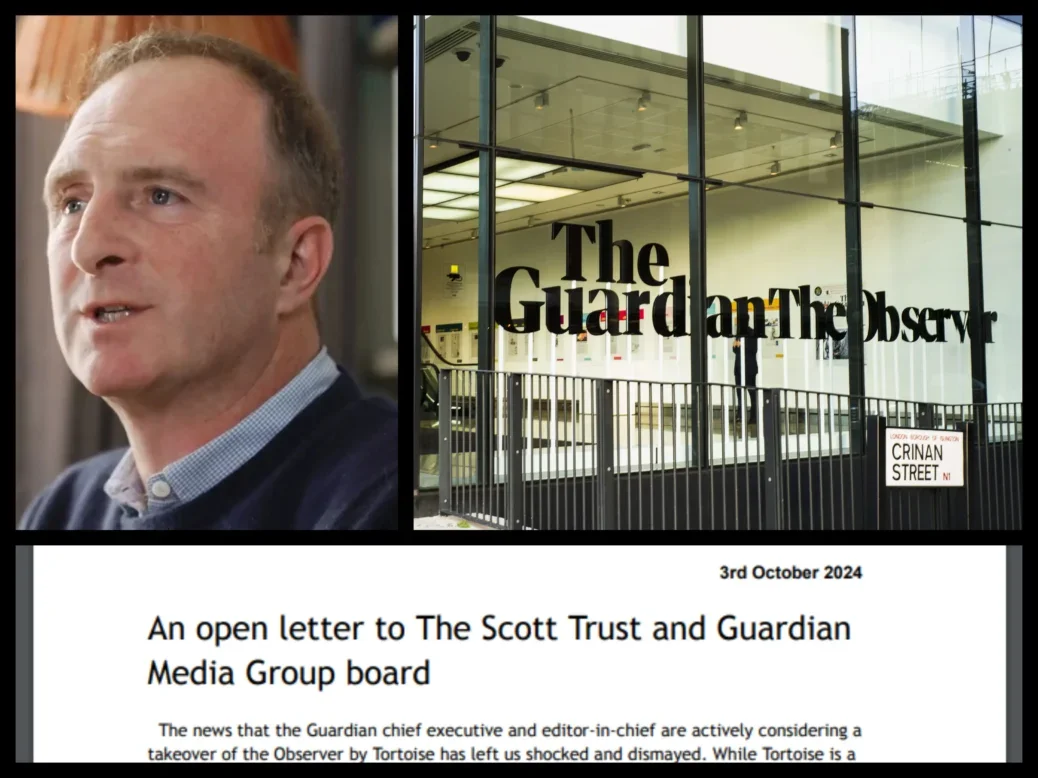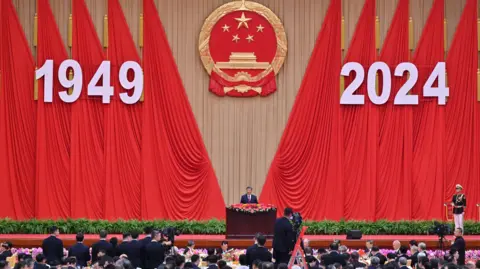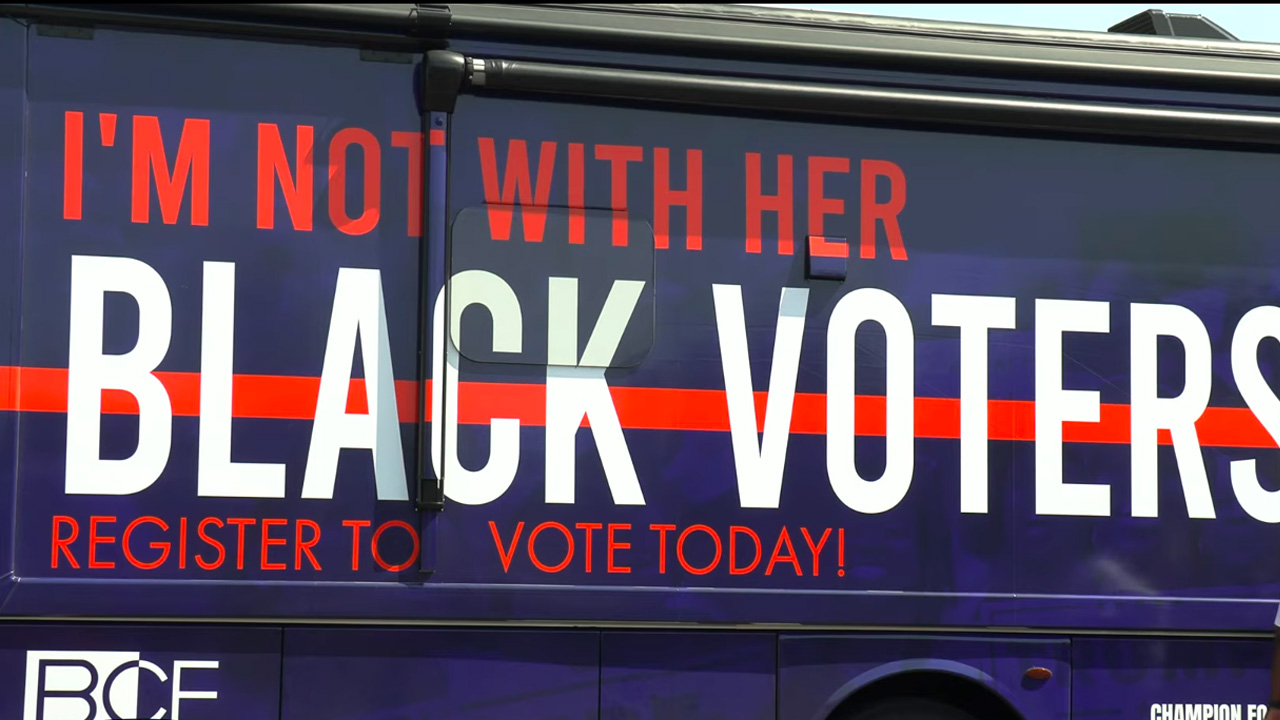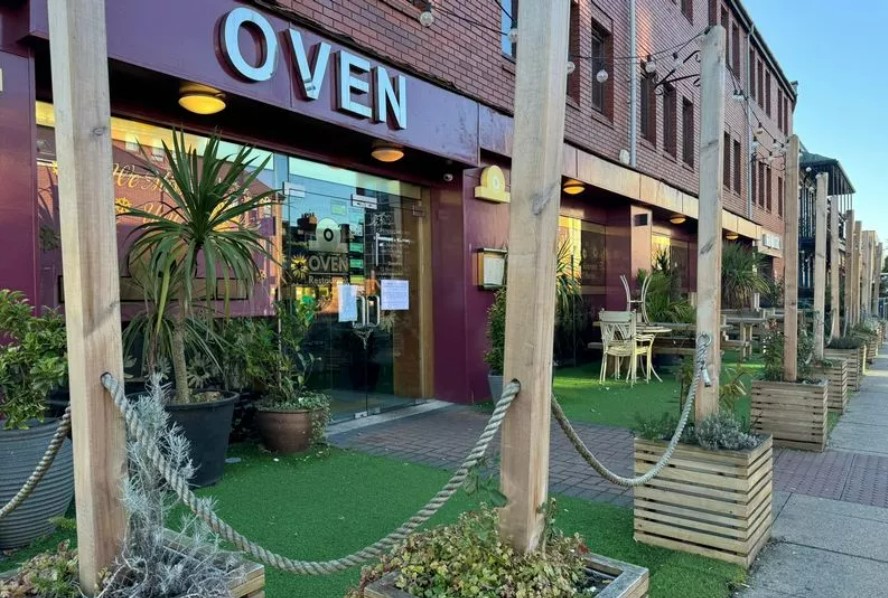News
Foreign Spending to Influence US Elections Beyond Russia

191
On September 4, the Department of Justice seized 32 internet domains alleged to be part of a Russian government “covert operation to interfere in and influence the outcome of” US elections. That same day, the DOJ unveiled an indictment of two employees of RT, a Russian state-controlled media outlet, for money laundering and spending $10 million to co-opt online US commentators in an effort to distribute “pro-Russian propaganda and disinformation” to American audiences.
Stories about Russian attempts to influence American elections are, of course, nothing new. After all, during the four years of Trump’s presidency, the big commercial news media devoted hours of programming and countless column-inches of coverage to “Russiagate,” the now-largely-debunked theory that Donald Trump or his campaign actively colluded with Russia to sway the 2016 presidential election. While there is no question that Russian intelligence operatives attempted to spread misinformation and purchased digital ads designed to impact the 2016 election, claims by news outlets, such as the New York Times, that these operatives were responsible for “the most effective foreign interference in an American election in history” are almost certainly overblown and exaggerated.
The fact is that the minions of Vladimir Putin are not the only foreign nationals scheming to influence our politics. Ongoing under-the-radar efforts by foreign-influenced companies and lobbyists for other countries designed to shape US elections and policy-making may not get the headlines that Russian propaganda operations do, but may ultimately be more effective and potentially even more damaging to our democracy.
Ignoring Dark Money Meddling by Foreign-Influenced Companies
Federal law prohibits contributions or expenditures made directly or indirectly by foreign nationals intended to influence US elections.
The first things that come to most people’s minds when they think about foreign meddling in US politics are cases in which American politicians or campaign operatives knowingly accept illegal contributions from foreign donors. Such cases do occur. For instance, New York City Mayor Eric Adams was recently indicted for knowingly accepting campaign donations from Turkish businessmen over a number of years. Last year, Republican campaign strategist Jessie Benton was sentenced to eighteen months in prison for soliciting an illegal contribution from a Russian businessman to Donald Trump’s presidential campaign.
But far more common and far more troubling are cases in which foreign-influenced companies make use of what are, in the United States, perfectly legal campaign finance mechanisms to obscure independent expenditures aimed at influencing the outcome of elections in ways that are not coordinated with a particular candidate or party.
In a pair of 2010 cases, Citizens United v. FEC and SpeechNow.org v. FEC, the Supreme Court held that legal restrictions on independent political expenditures by corporations, unions, and nonprofits violate the First Amendment and that organizations may raise and spend unlimited amounts of money on elections as long as they do not coordinate their spending with candidates, parties, and campaigns. Much of the independent money spent on elections is funneled into two sorts of organizations—super PACs, independent political action committees that can spend unlimited amounts on political messaging and campaign ads but must disclose their donors, and tax-exempt 501(c)4 “social welfare” organizations, which cannot spend the majority of their budgets on political activity but do not have to disclose their donors. Moreover, 501(c)4 organizations can, in turn, donate funds to super PACS, thereby rendering anonymous or “dark” expenditures by corporations and other deep-pocket donors intended to sway voters. Since 2010, the watchdog organization Open Secrets has tracked more than $2.8 billion in “dark money”—political expenditures from undisclosed sources—that has flooded into our elections.
The same legal loopholes that allow all wealthy corporations and individuals to spend millions in “dark money” to shape the political process also permit US corporations that are subsidiaries of foreign companies, or that have significant foreign ownership, to pour untraceable money into US elections. According to one estimate, 40 percent of US corporate equity is owned by foreign investors. A recent Open Secrets study of political expenditures by foreign-influenced corporations—corporations with more than 5 percent aggregate foreign ownership or individual foreign ownership of more than one percent—in state elections in Colorado, Michigan, Minnesota, Montana, New York, and Washington found that such companies were responsible for $163 million in contributions from 2018 to 2022. Meanwhile, foreign-connected company PACs spent nearly $20 million on federal elections in 2022 alone.
And just like domestic dark money funders, foreign-connected corporations often funnel their political spending through various “shell” and “front” organizations that make their spending exceedingly difficult to trace. For example, oil and gas giants BP and Shell are both wholly owned subsidiaries of foreign corporations. They are also both members of the US Chamber of Commerce, which is a major front of dark money spending, shelling out millions each year on “electioneering communication” in support of candidates it favors. The Chamber refuses to disclose its members or how much they each contribute to the funding of the organization’s vast lobbying and political influence operations. As a result, there is no way of knowing how much of the dark money the group disperses originates with foreign-connected companies.
The issue of dark money spending by foreign-influenced companies, like dark money spending in general, has been largely ignored by the corporate media. Two years ago, the Federal Election Commission fined Canadian billionaire steel magnate Barry Zekelman’s businesses nearly a million dollars for making $1.75 million in illegal campaign contributions to American First Action, a pro-Trump political action committee, in 2018. The fine was so unusual—and so large—that it received coverage in the New York Times and Newsweek. But, sadly, the FEC’s actions received more coverage in Zekelman’s home country of Canada than it did in the country whose election laws he violated.
Scant Coverage of Donations from Lobbyists for Foreign Powers
Another channel of foreign influence on our elections is campaign contributions made by foreign lobbyists.
Under the Foreign Agents Registration Act (FARA), individuals or entities engaged in lobbying or advocacy for foreign interests in the United States must register with the Department of Justice, report their activities, and disclose the pay they receive. According to Open Secrets, registered foreign agents “during the 2020 election cycle made at least $8.5 million in political contributions. Another $25 million in 2020 political contributions came from lobbyists representing foreign clients, including US subsidiaries owned or controlled by foreign parent companies, registered under the Lobbying Disclosure Act.” In July, Ben Freeman and Nick Cleveland-Stout of the Quincy Institute for Responsible Statecraft released a brief, “Foreign Lobbying in the US,” in which they report that “in 2022 and 2023, FARA registrants reported $14.3 million in political contributions.” Even more concerning, their research shows that “authoritarian regimes represent a majority of the most active countries—including Saudi Arabia and the UAE, which placed first and fourth, respectively, among the countries most engaged in political activities under FARA from 2022–23.”
Consider, for example, the political fundraising and lavish campaign spending orchestrated by Norm Coleman, former Republican Senator for Minnesota and a registered foreign agent representing the interests of the Kingdom of Saudi Arabia. As Responsible Statecraft reported in 2022, Coleman and his colleagues at the law firm of Hogan Lovells have a $175,000 per month lobbying contract with Saudi Arabia. Coleman is also the founder and chairman of the Congressional Leadership Fund (CLF), a super PAC that raised and spent some $165 million to elect Republicans to the House of Representatives in 2019–2020. So far, in the 2023–2024 cycle, the super PAC has raised approximately $131 million.
Coleman also chairs the dark money group American Action Network (AAN), a 501(c)4 “social welfare” organization that can devote some of its budget to electioneering but is not required to disclose the names of its donors. The organization describes the CLF as its “sister super PAC.” According to Responsible Statecraft, AAN—helmed by a foreign agent for Saudi Arabia—contributed some $30 million to the CLF’s pool of funds for the 2020 campaign cycle. Because AAN is not required to disclose its donors, there is no way of knowing whether some of the dark money it funneled to the CLF originated from non-US sources or not. At the very least, the arrangement is enough to arouse suspicion.
Over the past eight years, the establishment press has run perhaps a dozen articles on Saudi lobbying that contain brief allusions to Coleman’s post-Congress career as a shill for the Kingdom. He was name-checked in passing as Hogan Lovells’s “point person for Saudi work” in an October 11, 2018, New York Times article on the PR fallout from the murder of Saudi journalist Jamal Khashoggi. Coleman’s use of his “Hill contacts” to work on the Saudi’s behalf was referenced in a 2021 Washington Post report about the firms that dictators hire to clean up their images. Stunningly, however, only one of these articles, an October 21, 2018, Washington Post article on “the Saudi’s Washington influence machine,” bothered to mention that Coleman “also founded a super PAC,” but even then failed to identify the Congressional Leadership Fund by name or to mention the tens of millions it spends on electioneering. The New York Times has run a few articles discussing Coleman’s role as chair of AAN and/or the CLF. Amazingly, though, no establishment news outlet connected Coleman’s vigorous fundraising for the CLF and AAN with his advocacy work for the Saudis.
Where is the Reporting on Legislation to Limit the Influence of Foreign Money on Our Politics?
Not surprisingly, the corporate media have also consistently ignored efforts by citizens and elected officials to limit the influence of foreign money on our politics.
On April 13, 2023, the governor of Minnesota, Tim Walz, signed into law the Democracy for the People Act that, among other things, prohibits “any company that is five percent or more owned by multiple foreign owners, or one percent or more owned by a single foreign owner, from spending money in Minnesota state or local elections or donating money to a super PAC or other entity to spend.” The law had been pushed by a coalition of unions and civic groups called Expanding Democracy. Shortly after Walz signed the law, the Minnesota Chamber of Commerce sued to invalidate the prohibition on campaign spending by foreign-influenced corporations. US District Court Judge Eric Tostrud granted a preliminary injunction preventing the law from going into effect while the Chamber of Commerce lawsuit wends its way through the courts.
Despite this, Minnesota’s law has become a model for other states. Over the summer, the Pennsylvania House passed identical legislation, and supporters of the bill marched thirty-five miles to the state capitol in Harrisburg to urge the Pennsylvania Senate to ratify the bill. In July, Ohio passed a bill that banned spending by foreign-influenced businesses and green-card holders on ballot initiative campaigns (which was subsequently blocked by a judge’s order). At the federal level, Democratic legislators in both the Senate and the House introduced the Get Foreign Money Out of US Elections Act, which would “ban firms with either 5% of foreign ownership in aggregate or 1% ownership by a single foreign entity from electoral spending.” Opinion polling suggests that strong, bipartisan majorities of voters want to prevent foreign-controlled corporations from influencing our politics.
Yet, the establishment media have, to date, not reported on legislative initiatives to limit foreign influence on US elections. Most reporting on bills like the Democracy for the People Act has come from independent, not-for-profit, and local media. If the issue of foreign dark money corrupting our elections received even a fraction of the attention that Russiagate or Trump’s bogus claims about undocumented immigrants voting illegally have, Congress and state legislatures would have no choice but to act.
News
Guardian and Observer staff vote for possible strike over Tortoise sale plan

Guardian and Observer journalists have agreed they may take industrial action in protest at plans to sell The Observer to Tortoise Media.
The move comes as a group of prominent cultural figures, many of whom have contributed to The Observer, submitted an open letter to Press Gazette blasting the possible sale, saying it is “disastrous” and values the paper “at or near zero”.
Up to 400 staff attended a meeting of the combined Guardian and Observer NUJ chapel on Thursday (3 October) where strong feelings were aired opposing the deal.
The packed mandatory meeting went on for more than an hour and was a mixture of in-person and via Google Meet.
Two votes were passed unanimously: to put the matter “into dispute” and “if necessary” to hold “industrial action”.
The Guardian and Observer titles are owned by the Scott Trust, whose purpose is “to secure the financial and editorial independence of the Guardian in perpetuity…remaining faithful to its liberal tradition”.
Content from our partners
Press Gazette understands staff complained about what was seen as a failure of the Trust to protect plural liberal journalism in tough times. Some spoke about a sense of “betrayal” amongst Observer journalists who have worked at the company for 30 years or more.
There was also concern raised that readers who have made financial donations in order to support Observer journalism will feel misled if the title is sold.
Mention was also made of The Guardian’s “Not For Sale” marketing campaign last year which emphasised the title’s editorial independence. Some staff at the meeting said it was ironic that in fact The Observer did seem to be for sale and apparently at a nominal price.
Guardian Media Group announced on 17 September that it was in a period of exclusive negotiations to sell The Observer to Tortoise Media, which is mainly a podcast publisher.
Tortoise founder and main shareholder James Harding has not yet revealed who is financially backing The Observer bid which is said to include £25m of investment over five years (over and above the title’s running costs). But he has assured staff that the deal will be a boost to liberal journalism.
Around 70 Observer staff would transfer over with the deal.
Both the Scott Trust and Guardian management appear keen to do the deal, with chief executive Anna Bateson describing it as “an exciting opportunity” to build The Observer and “allow The Guardian to focus on its growth strategy”.
Press Gazette understands that Harding has met with some Observer staff but there are still widespread concerns about job security if the deal goes through. Guardian and Observer journalists currently benefit from an NUJ house agreement which includes a no compulsory redundancies promise.
A Guardian spokesperson said: “We are in negotiations about the offer from Tortoise Media to buy the Observer and we are grateful to everyone who has fed their thoughts into discussions so far. One of the reasons for being transparent about the offer was so that we could openly engage with Observer staff. There is still a lot of information to work through and we will continue to discuss internally.”
Prominent cultural figures blast Tortoise bid for The Observer in open letter
Also on Thursday a group of more than 70 prominent UK cultural figures including Oscar-winning actors and directors and some of the UK’s leading novelists and playwrights addressed an open letter to the Scott Trust and Guardian Media Group describing the possible deal as “a betrayal” and calling on them “to reject this ill-considered offer at once”.
Among the signatories were actor Ralph Fiennes, musician and broadcaster Jarvis Cocker, broadcaster Carole Vorderman, playwright Tom Stoppard and actress Lesley Manville.
The letter in full:
The news that the Guardian chief executive and editor-in-chief are actively considering a takeover of the Observer by Tortoise has left us shocked and dismayed. While Tortoise is a respected media outlet, we believe that the move would be disastrous for the world’s oldest Sunday newspaper and its journalists, for the Guardian and for liberal journalism.
While figures of £100m are being bid for other publications, this poorly funded approach sets the value of the Observer at or near zero. The proposal also envisages moving it from a resilient and well-funded newspaper publisher to a small, loss-making digital startup whose funding for the takeover would in all likelihood come from private equity.
Is Tortoise really committed to continuing with the Observer in print? If it were to discontinue the newspaper or if the business were to fail, the Guardian’s editor-in-chief and chief executive and the Scott Trust, which owns Guardian Media Group, would go down in history as being responsible for the demise of the last liberal Sunday newspaper.
The immediate financial threat to the newspaper’s journalism, and its staff, is clear. Even if it were to survive, the Observer would be much changed – cut off from its network of foreign correspondents, sports reporters and business journalists. Leading writers, familiar to the paper’s readers for years, would be gone. Guardian supporters would lose the Observer’s voice and presence on the Guardian website and app. And if, as seems inevitable, the Observer’s politics, arts and culture coverage is to go behind a paywall, then its unique voice in Britain’s national conversation will be muted.
The Scott Trust, the Observer’s parent for 30 years, prides itself on providing a home for journalism free from the taint of corporate interests. Its engagement with this offer, however, suggests that the Observer’s award-winning reporting is something that the organisation, with its £1.3bn endowment, is no longer interested in protecting.
We call on Guardian Media Group and the Scott Trust to reject this ill-considered offer at once, and to retain the Observer as a key element of its seven-day print and online operation. Failure to do so would be a betrayal of the Observer, its staff and its readers.
Yours sincerely,
Monica Ali (author)
Joan Bakewell (journalist and peer)
Julian Barnes (author)
Mary Beard (classicist and broadcaster)
Frank Cottrell Boyce (screenwriter and novelist)
Rosie Boycott (journalist and peer)
Asa Butterfield (actor)
Dorothy Byrne (former television news executive)
Simon Callow (actor)
Bridget Christie (comedian)
Eliza Clark (author)
Jarvis Cocker (musician and broadcaster)
Jonathan Coe (author)
Richard Coles (author and priest)
Stephen Daldry (director and producer)
Janie Dee (actress)
Jeremy Deller (artist)
Clint Dyer (director and actor)
Richard Eyre (director)
Ralph Fiennes (actor and producer)
Hugh Fearnley-Whittingstall (chef and broadcaster)
Nicole Flattery (author)
Michael Frayn (playwright and author)
Mark Gatiss (actor and director)
Bobby Gillespie (musician)
Howard Goodall (composer)
Hugh Grant (actor)
Colin Greenwood (musician)
Philippa Gregory (author)
Sheila Hancock (actress)
David Hare (playwright and director)
Robert Harris (author)
Lord Peter Hennessy (historian and peer)
Billy Howle (actor)
Toby Jones (actor)
Asif Kapadia (filmmaker)
Jackie Kay (poet and author)
Helena Kennedy (barrister and peer)
Peter Kosminsky (writer and director)
David Kynaston (historian)
Duncan Kenworthy OBE (producer)
Daisy Lafarge (author and poet)
David Lan (playwright)
Dame Hermione Lee (biographer and academic)
Anton Lesser (actor)
Adrian Lester (actor and director)
Damian Lewis (actor)
Joe Lycett (comedian)
Caroline Lucas (politician)
Lesley Manville (actress)
Robert McCrum (author)
David Morrissey (actor and fiilmmaker)
Ian McEwan (author and screenwriter)
Robert Macfarlane (author and academic)
Sophie Mackintosh (author)
Sienna Miller (actress)
Abi Morgan (playwright and screenwriter)
Michael Morpurgo (author)
Mike Newell (director)
Bill Nighy (actor)
Megan Nolan (author)
James O’Brien (broadcaster)
Mark O’Connell (writer)
Andi Oliver (chef)
Michael Ondaatje (poet and writer)
Richard Ovenden (librarian and author)
Chris Packham (naturalist and broadcaster)
Pawel Pawlikowski (filmmaker)
Maxine Peake (actress)
Alistair Petrie (actor)
Jonathan Pryce (actor)
Philip Pullman (author)
Steve Punt (comedian)
Mark Rylance (actor)
Michael Rosen (author)
Dominic Savage (director)
Tom Shakespeare (sociologist)
Lemn Sissay (author and broadcaster)
Gillian Slovo (author)
Tom Stoppard (playwright and screenwriter)
Olivia Sudjic (author)
Wolfgang Tilmans (photographer)
Carol Vorderman (broadcaster)
Harriet Walter (actress)
John Ware (journalist)
Email pged@pressgazette.co.uk to point out mistakes, provide story tips or send in a letter for publication on our “Letters Page” blog
Business
As communist China turns 75 can Xi fix its economy?

 Getty Images
Getty ImagesAs China prepared to celebrate its Golden Week holiday and mark the 75th anniversary of the People’s Republic, the ruling Communist Party rolled out a raft of measures aimed at boosting its ailing economy.
The plans included help for the country’s crisis-hit property industry, support for the stock market, cash handouts for the poor and more government spending.
Shares in mainland China and Hong Kong chalked up record gains after the announcements.
But economists warn the policies may not be enough to fix China’s economic problems.
Some of the new measures announced by the People’s Bank of China (PBOC) on 24 September took direct aim at the country’s beaten-down stock market.
The new tools included funding worth 800bn yuan ($114bn; £85.6bn) that can be borrowed by insurers, brokers and asset managers to buy shares.
Governor, Pan Gongsheng, also said the central bank would offer support to listed companies that want to buy back their own shares and announced plans to lower borrowing costs, and allow banks to increase their lending.
Just two days after the PBOC’s announcement, Xi Jinping chaired a surprise economy-focused meeting of the country’s top leaders, known as the Politburo.
Officials promised to intensify government spending aimed to support the economy.
On Monday, the day before China headed off for a weeklong holiday, the benchmark Shanghai Composite Index jumped by more than 8%, in its best day since the 2008 global financial crisis. The move capped off a five-day rally that saw the index jump by 20%.
The following day, with markets closed on the mainland, the Hang Seng in Hong Kong rose by over 6%.
“Investors loved the announcements”, China analyst, Bill Bishop said.
While investors may have been popping champagne corks, Mr Xi has deeper issues to tackle.
 Getty Images
Getty ImagesThe People’s Republic marking its 75th anniversary means it has been in existence longer than the only other major communist sate – the Soviet Union – which collapsed 74 years after its founding.
“Avoiding the fate of the Soviet Union has long been a key concern for China’s leaders,” said Alfred Wu, an associate professor at the Lee Kuan Yew School of Public Policy in Singapore.
At the forefront of officials’ minds will be boosting confidence in the broader economy amid growing concerns that it may miss its own 5% annual growth target.
“In China targets must be met, by any means necessary,” said Yuen Yuen Ang, professor of political economy at Johns Hopkins University.
“The leadership worries that failing to meet them in 2024 will worsen a downward spiral of slow growth and low confidence.”
One of the main drags on the world’s second-largest economy has been the downturn in the country’s property market which began three years ago.
Aside from policies aimed at boosting stocks, the recently unveiled stimulus package also targeted the real estate industry.
It includes measures to increase bank lending, mortgage rate cuts and lower minimum down payments for second-home buyers.
But there’s scepticism that such moves are enough to shore up the housing market.
“Those measures are welcome but unlikely to shift the needle much in isolation,” said Harry Murphy Cruise, an economist at Moody’s Analytics.
“China’s weakness stems from a crisis of confidence, not one of credit; firms and families don’t want to borrow, regardless of how cheap it is to do so.”
At the Politburo session, leaders vowed to go beyond the interest rate cuts and tap government funds to boost economic growth.
However, beyond setting priorities like stabilising the property market, supporting consumption and boosting employment, the officials offered little in the way of details about the size and scope of government spending.
“Should the fiscal stimulus fall short of market expectations, investors could be disappointed,” warned Qian Wang, chief economist for the Asia Pacific region at Vanguard.
“In addition, cyclical policy stimulus does not fix the structural problems,” Ms Wang noted, hinting that without deeper reforms the problems China’s economy face will not go away.
Economists see tackling entrenched problems in the real estate market as key to fixing the broader economy.
Property is the biggest investment most families will make and falling house prices have helped undermined consumer confidence.
“Ensuring the delivery of pre-sold but unfinished homes would be key,” said a note from Sophie Altermatt, an economist with Julius Baer.
“In order to increase domestic consumption on a sustainable basis, fiscal support for household incomes needs to go beyond one-off transfers and rather come through improved pension and social security systems.”
 Getty Images
Getty ImagesOn the day of the 75th anniversary, an editorial in the state-controlled newspaper, People’s Daily, struck an optimistic tone, recognising that “while the journey ahead remains challenging, the future is promising”.
According to the article, concepts created by President Xi such as “high-quality development” and “new productive forces” are key to unlocking that path to a better future.
The emphasis on those ideas reflects Xi’s push to switch from the fast drivers of growth in the past such as property and infrastructure investment, while trying to develop a more balanced economy based on high-end industries.
The challenge China faces, according to Ms Ang, is that the “old and the new economies are deeply intertwined; if the old economy falters too quickly, it will inevitably hinder the rise of the new”.
“This is what the leadership has come to realise and is responding to.”
Money
Two big name chains bring back festive favourites to all stores including Terry’s Chocolate Orange treat and mince pies

TWO huge chains have already started getting into the festive spirit.
Christmas favourites will be returning to menus at Costa Coffee and Greggs.
The coffee chain will be serving up their much-loved Terry’s Chocolate Orange Muffin, while Greggs will be dishing out the Sweet Mince pies.
They are following in the footsteps of supermarkets which have already started stocking shelves with festive food.
The wider Christmas menus will be rolled out later in the year.
Costa Coffee
The coffee shop is bringing back it’s own spin on the humble, yet mouthwatering, mince pie.
The Mince Tart is gluten-free and suitable for vegans and looks almost too good to eat.
Adorned with a pastry star and a sprinkle of icing sugar, the slice is the perfect treat to accompany a frothy coffee.
For those who love a classic, the traditional All Butter Mince Pie has also returned to Costa.
The beloved Terry’s Chocolate Orange Muffin is perfect for chocolate lovers, featuring a rich chocolate and orange muffin filled with sauce in the same flavour.
The sweet treat is topped with a Terry’s segment.
Greggs
The best way to kick off the start of the festive season is undoubtedly with a Greggs Sweet Mince Pie, which fans can indulge in from just 65p per pie.
For those looking to spread the festive cheer with their friends and family, a pack of six Sweet Mince Pies is available from only £2.25.
Vegan lovers of Greggs can also savour the festive favourite, as the vegan-friendly recipe consists of a crumbly shortcrust pastry, filled with a sweet mincemeat made from vine fruits, Bramley apple, candied orange and lemon peel.
For those of you who aren’t quite ready for Christmas just yet, Greggs has launched its Halloween range.
Fans can enjoy the festive and Halloween feels with a Sweet and Hot Drink Deal, pairing one of the new sweet menu items with a hot drink from just £2.85.
The new Pumpkin biscuit, a ginger biscuit coated in Fairtrade milk chocolate, is available from just £1.25.
The Spooky Bun, a vanilla flavour fairy bun dipped in fondant icing and topped with spine-chilling sugar decorations is also available from only £1.00.
For Greggs fans organising feasts for friends and family this Halloween, the Spooky Bun is also available as a pack of four from £3.15.
This comes after Sainsbury’s shoppers were shocked to find mince pies on sale in early September.
The gobsmacked customer wrote in the caption: “Stock up on your mince pies (take in Sainsbury’s a few days ago, so it was actually August!!!!).”
Another shopper who stumbled upon the Christmas treats in the major supermarket also took to X, and wrote: “On Sept 1 I walked into my local Sainsbury and what did I see on the shelves?
Tesco’s Christmas range has been slowly making its way into supermarkets and, with the festive season now on the horizon with under 100 days to go, the goods will soon be available at all of its 4,000 branches.
ASDA also unveiled its Christmas menu and customers can snap up spiced rum mince pies and parmesan and truffle pigs in blankets.
How to save money eating out
THERE are a number of ways that you can save money when eating out. Here’s how:
Discount codes – Check sites like Sun Vouchers or VoucherCodes for any discount codes you can use to get money off your order.
Tastecard – This is a members club where you pay to have access to discounts worth up to 50 per cent off at thousands of restaurants. It costs £4.99 a month or £34.99 for the year.
Loyalty schemes – Some restaurants will reward you with discounts or a free meal if you register with their loyalty scheme, such as Nando’s where you can collect a stamp with every visit. Some chains like Pizza Express will send you discounts for special occasions, such as your birthday, if you sign up to their newsletter.
Voucher schemes – Look out for voucher schemes offered by third party firms, such as Meerkat Meals. If you compare and buy a product through CompareTheMarket.com then you’ll be rewarded with access to the discount scheme. You’ll get 2 for 1 meals at certain restaurants through Sunday to Thursday.
Student discounts – If you’re in full-time education or a member of the National Students Union then you may be able to get a discount of up to 15 per cent off the bill. It’s always worth asking before you place your order.
For the first time ever, Asda has launched its first signature flavour – brown butter and spiced dark rum.
The flavour runs through a number of the festive food items ,including brown butter and spice dark rum mince pies and a slow cooked turkey with dark rum and brown butter stuffing.
There’s something for all palates and preferences too, with 57 new vegan and 35 new free from products included in the range.
Customers will be able to pick up no-meat turkeys, mushroom pigs in blankets and smoky aubergine bacon.
News
‘Blacks for Trump’ and Pennsylvania progressives play for undecided voters

As the 2024 presidential election enters its final month, a clear result has yet to materialize. Both parties are campaigning for undecided votes, and making some possibly unconventional choices along the way. Taya Graham reports from Baltimore and the suburbs of Lancaster, PA for The Real News, where conservatives and progressives alike are making a play for key swing voters.
Videography / Post-Production: Stephen Janis
Transcript
Taya Graham: This is Taya Graham for The Real News Network in Baltimore City, Maryland. I’m standing in a parking lot in Baltimore where just last week the so-called Blacks for Trump bus appeared, hoping to change hearts and minds in a very blue state. It’s one of many efforts to sway the precious handful of undecided voters in an election that many say is too close to call.
So we went on the ground from Baltimore to Pennsylvania to document two radically different approaches to picking up votes in otherwise hostile territory.
As the election looms over a bitterly divided partisan landscape, parties on both sides are pushing to make gains in otherwise unfriendly territory. Last week, Black Republicans visited deep blue Baltimore city on a so-called More Money with Trump bus tour. While attendance was low, confidence was not.
Diante Johnson: Baltimore is not an area that’s going conservative. The media has asked, why are we here? We can take Baltimore and with people like Kim Klacik, we will take Baltimore [crowd cheers].
Taya Graham: Kimberly Klacik, candidate for the state’s second congressional district in Maryland, said her party was reaching out to Black voters. Her argument? Democrats take them for granted.
What exactly are we seeing here? I’m not with her, the Black voters for Trump. What is this bus?
Kim Klacik: Yeah, so President Trump and of course VCF, they’re all in town today, just visiting areas like here, Morgan State University, just letting these students know that there is an option. You don’t have to vote for the leaning left Kamala, you don’t have to vote for this administration again. You can vote for change, which would be President Trump in this situation.
Speaker 1: Challenge them on the, he’s a racist. What does that mean? Tell me, what do you mean? He’s a misogynist. What does that have to do about good policies, effective policies that work for our country?
Taya Graham: Others said conservative ideas appeal to Black voters, even though they vote disproportionately Democrat.
Speaker 2: We stopped here in front of a grocery store in a targeted community because we know that inflation is high. We know that people are struggling to put food on the table for their families.
Taya Graham: The stakes are unusually high in Maryland. There, a former popular Republican governor, Larry Hogan, is running for a Senate seat that has been in Democratic hands for decades. His opponent, former Prince George’s County Executive Angela Alsobrooks, has been touting Hogan’s ties to Trump, but polls show the race is tight.
Meanwhile, in Pennsylvania, a different approach. At a community center, Lancaster Stands Up is organizing in the critical swing state that most agree could decide the presidential election. The nonpartisan group focuses on issues supporting candidates that back their policies. That means affordable housing, a living wage, and reproductive freedom.
Lindsay: So we’re a nonpartisan organization. So our goal is really to just support candidates both locally and on the national level that represent our values. So our members vote on local candidates, and then once we endorse them, we like to offer support through things like canvassing, phone banking, hosting meet and greets, things like that.
David Miller-Glick: We definitely do skew more towards Democrat than Republican. We tend to have a lot of problems with Republicans on labor rights and how they don’t really support workers.
Speaker 3: So we are running IE phones for Harris and Wallace because originally, we weren’t going to do anything when Biden was going to be this presidential candidate. But now that it’s Harris, we feel like she’s someone that we’ll be able to organize with and potentially work with in DC.
Taya Graham: Today, they were preparing people for door knocking, hoping that one-on-one encounters can change minds.
But just down the road in Lititz, a divided town shows changing minds won’t be easy.
Speaker 4: It’s a very polarizing time right now.
Taya Graham: Passions were so high that one resident we spoke to says he avoids talking about politics altogether.
Speaker 4: If you want to stay friendly with people, you don’t talk about politics. That’s the bottom line. Nobody’s getting convinced, and that includes my family. I don’t agree with my kids.
Taya Graham: Nevertheless, the people who did want to talk on the record about their choices were adamant.
May I ask who you’re voting for?
Speaker 5: Kamala Harris, and I just don’t like his politics and do not like what he would like to see, which is the United States to become a dictatorship.
Taya Graham: Phyllis, can you tell me if you’ve decided that you’re going to vote?
Phyllis: Yes, I have decided. Trump.
Taya Graham: Can you share with me what policies have inspired you to, if there’s anything in particular that really stands out to you as why you’re voting for him, I assume for the second time?
Phyllis: Just overall, because I don’t like who’s running against him.
Taya Graham: Is it the policies or the person you don’t like?
Phyllis: Policies and the person.
Taya Graham: This is Taya Graham and Stephen Janis for The Real News Network, election coverage 2024.
Related
Business
Keir Starmer stops taking donations for clothes
‘He’s started buying his own clothes’
Money
Top chef who worked in Michelin star kitchens & cooked for US President has doors of his popular restaurant ‘chained up’

A TOP chef who worked in Michelin star kitchens and cooked for the US president has seen the doors of his popular restaurant chained shut.
Tarek Thoma owns a string of successful restaurants in Middlesbrough, but his venue, Oven, is set to be ripped away.
Chains were spotted wrapped around the doors while eviction notices have been slapped on windows.
It is understood landlords took possession of the £500,000 eatery.
Devastated fans shared their fury on social media, one wrote: “After booking a table at the Oven Restaurant Middlesbrough on Monday for tonight for 14 people for a special occasion we turned up to find the establishment chained up and a possession order stuck to the door.”
Another added: ” “Feel sorry for the staff and owner. Always always nice food and service, one of the better restaurants in Middlesbrough.”
Meanwhile an eviction notice taped to the windows read: “To all and any others this may concern. Take notice that the landlord has this day 2 October, 2024, exercised their right to peaceably re-enter and take possession of this premises known as ground floor, 202-204 Linthorpe Road, Middlesbrough, TS1 3QW.
“Any lease or license is hereby determined. This property is now legally occupied by the landlords.
“Any attempt to break into this property will be classed as an attempt to break into this property will be classed as a criminal offence and will be reported to the police.”
Taerek also runs the popular Bazaar, in Captain Cook Square, from which an employee confirmed the downfall of Oven.
A spokesperson for the landlords, Pneuma Group, claimed there had been problems with the tenancy which resulted in the “difficult decision to re-enter our premises”.
Oven was created nearly 10 years ago after opening its doors to hungry customers, and 45 employees, in 2015.
Mr Thoma poured £500,000 into the business, and vowed to provide a Michelin experience for affordable prices.
Outside there is a generous, and stylish seating area, while inside holds enough space for up to 160 people.
The menu offered British, French, Mediterranean and Middle Eastern cuisine, meaning there was something for everyone.
Dishes were prepared by chefs who learnt from professionals with Michelin star training.
Tarek himself previously cooked for President George and Prime Minister Tony Blair.
Tarek, who has also worked at Michelin-starred restaurants including the L’Escargot in London and Chapter One in Kent, previously said: “My staff and I are looking forward to welcoming guests to Oven and serving them with Michelin star-style food at very affordable prices.
“This area of Middlesbrough is becoming a hive of culinary activity and Oven will bring something different to this growing gastronomic scene.”
The Sun contacted Tarek Thoma for comment.
-

 Womens Workouts1 week ago
Womens Workouts1 week ago3 Day Full Body Women’s Dumbbell Only Workout
-

 Science & Environment2 weeks ago
Science & Environment2 weeks agoHow to unsnarl a tangle of threads, according to physics
-

 Technology2 weeks ago
Technology2 weeks agoWould-be reality TV contestants ‘not looking real’
-

 Science & Environment2 weeks ago
Science & Environment2 weeks ago‘Running of the bulls’ festival crowds move like charged particles
-

 Science & Environment2 weeks ago
Science & Environment2 weeks agoHyperelastic gel is one of the stretchiest materials known to science
-

 Science & Environment2 weeks ago
Science & Environment2 weeks agoMaxwell’s demon charges quantum batteries inside of a quantum computer
-

 News2 weeks ago
News2 weeks agoOur millionaire neighbour blocks us from using public footpath & screams at us in street.. it’s like living in a WARZONE – WordupNews
-

 Science & Environment2 weeks ago
Science & Environment2 weeks agoHow to wrap your mind around the real multiverse
-

 Science & Environment2 weeks ago
Science & Environment2 weeks agoSunlight-trapping device can generate temperatures over 1000°C
-

 Science & Environment2 weeks ago
Science & Environment2 weeks agoLiquid crystals could improve quantum communication devices
-

 Science & Environment2 weeks ago
Science & Environment2 weeks agoITER: Is the world’s biggest fusion experiment dead after new delay to 2035?
-

 Science & Environment2 weeks ago
Science & Environment2 weeks agoPhysicists are grappling with their own reproducibility crisis
-

 Science & Environment2 weeks ago
Science & Environment2 weeks agoQuantum ‘supersolid’ matter stirred using magnets
-

 News2 weeks ago
News2 weeks agoYou’re a Hypocrite, And So Am I
-

 Science & Environment2 weeks ago
Science & Environment2 weeks agoWhy this is a golden age for life to thrive across the universe
-

 Sport2 weeks ago
Sport2 weeks agoJoshua vs Dubois: Chris Eubank Jr says ‘AJ’ could beat Tyson Fury and any other heavyweight in the world
-

 Science & Environment2 weeks ago
Science & Environment2 weeks agoQuantum forces used to automatically assemble tiny device
-

 Science & Environment2 weeks ago
Science & Environment2 weeks agoCaroline Ellison aims to duck prison sentence for role in FTX collapse
-

 Science & Environment2 weeks ago
Science & Environment2 weeks agoNuclear fusion experiment overcomes two key operating hurdles
-

 Science & Environment2 weeks ago
Science & Environment2 weeks agoTime travel sci-fi novel is a rip-roaringly good thought experiment
-

 Science & Environment2 weeks ago
Science & Environment2 weeks agoLaser helps turn an electron into a coil of mass and charge
-
News3 weeks ago
the pick of new debut fiction
-

 Science & Environment2 weeks ago
Science & Environment2 weeks agoNerve fibres in the brain could generate quantum entanglement
-

 News2 weeks ago
News2 weeks agoIsrael strikes Lebanese targets as Hizbollah chief warns of ‘red lines’ crossed
-

 CryptoCurrency2 weeks ago
CryptoCurrency2 weeks agoCardano founder to meet Argentina president Javier Milei
-

 Science & Environment2 weeks ago
Science & Environment2 weeks agoMeet the world's first female male model | 7.30
-

 News2 weeks ago
News2 weeks ago▶️ Media Bias: How They Spin Attack on Hezbollah and Ignore the Reality
-

 Science & Environment2 weeks ago
Science & Environment2 weeks agoFuture of fusion: How the UK’s JET reactor paved the way for ITER
-

 Womens Workouts2 weeks ago
Womens Workouts2 weeks agoBest Exercises if You Want to Build a Great Physique
-

 News2 weeks ago
News2 weeks agoWhy Is Everyone Excited About These Smart Insoles?
-

 Technology6 days ago
Technology6 days ago‘From a toaster to a server’: UK startup promises 5x ‘speed up without changing a line of code’ as it plans to take on Nvidia, AMD in the generative AI battlefield
-

 MMA6 days ago
MMA6 days agoConor McGregor challenges ‘woeful’ Belal Muhammad, tells Ilia Topuria it’s ‘on sight’
-

 CryptoCurrency2 weeks ago
CryptoCurrency2 weeks agoEthereum is a 'contrarian bet' into 2025, says Bitwise exec
-

 Science & Environment2 weeks ago
Science & Environment2 weeks agoA new kind of experiment at the Large Hadron Collider could unravel quantum reality
-

 Health & fitness2 weeks ago
Health & fitness2 weeks agoThe secret to a six pack – and how to keep your washboard abs in 2022
-

 Science & Environment2 weeks ago
Science & Environment2 weeks agoA slight curve helps rocks make the biggest splash
-
Business2 weeks ago
JPMorgan in talks to take over Apple credit card from Goldman Sachs
-

 Science & Environment2 weeks ago
Science & Environment2 weeks agoQuantum time travel: The experiment to ‘send a particle into the past’
-

 Science & Environment2 weeks ago
Science & Environment2 weeks agoUK spurns European invitation to join ITER nuclear fusion project
-

 Science & Environment2 weeks ago
Science & Environment2 weeks agoWhy we need to invoke philosophy to judge bizarre concepts in science
-

 CryptoCurrency2 weeks ago
CryptoCurrency2 weeks agoBitcoin miners steamrolled after electricity thefts, exchange ‘closure’ scam: Asia Express
-

 CryptoCurrency2 weeks ago
CryptoCurrency2 weeks agoDorsey’s ‘marketplace of algorithms’ could fix social media… so why hasn’t it?
-

 CryptoCurrency2 weeks ago
CryptoCurrency2 weeks agoDZ Bank partners with Boerse Stuttgart for crypto trading
-

 CryptoCurrency2 weeks ago
CryptoCurrency2 weeks agoLow users, sex predators kill Korean metaverses, 3AC sues Terra: Asia Express
-

 CryptoCurrency2 weeks ago
CryptoCurrency2 weeks agoBitcoin bulls target $64K BTC price hurdle as US stocks eye new record
-

 Womens Workouts2 weeks ago
Womens Workouts2 weeks agoEverything a Beginner Needs to Know About Squatting
-

 News2 weeks ago
News2 weeks agoFour dead & 18 injured in horror mass shooting with victims ‘caught in crossfire’ as cops hunt multiple gunmen
-

 Womens Workouts1 week ago
Womens Workouts1 week ago3 Day Full Body Toning Workout for Women
-

 Travel1 week ago
Travel1 week agoDelta signs codeshare agreement with SAS
-

 Politics1 week ago
Politics1 week agoHope, finally? Keir Starmer’s first conference in power – podcast | News
-

 Sport2 weeks ago
Sport2 weeks agoUFC Edmonton fight card revealed, including Brandon Moreno vs. Amir Albazi headliner
-

 Technology2 weeks ago
Technology2 weeks agoiPhone 15 Pro Max Camera Review: Depth and Reach
-

 News2 weeks ago
News2 weeks agoBrian Tyree Henry on voicing young Megatron, his love for villain roles
-

 Health & fitness2 weeks ago
Health & fitness2 weeks agoThe maps that could hold the secret to curing cancer
-

 Science & Environment2 weeks ago
Science & Environment2 weeks agoBeing in two places at once could make a quantum battery charge faster
-

 News3 weeks ago
News3 weeks ago▶️ Hamas in the West Bank: Rising Support and Deadly Attacks You Might Not Know About
-

 CryptoCurrency2 weeks ago
CryptoCurrency2 weeks agoRedStone integrates first oracle price feeds on TON blockchain
-

 CryptoCurrency2 weeks ago
CryptoCurrency2 weeks agoBlockdaemon mulls 2026 IPO: Report
-

 CryptoCurrency2 weeks ago
CryptoCurrency2 weeks agoCoinbase’s cbBTC surges to third-largest wrapped BTC token in just one week
-

 Servers computers1 week ago
Servers computers1 week agoWhat are the benefits of Blade servers compared to rack servers?
-

 Football5 days ago
Football5 days agoFootball Focus: Martin Keown on Liverpool’s Alisson Becker
-
Business5 days ago
Eurosceptic Andrej Babiš eyes return to power in Czech Republic
-

 Science & Environment2 weeks ago
Science & Environment2 weeks agoHow one theory ties together everything we know about the universe
-

 CryptoCurrency2 weeks ago
CryptoCurrency2 weeks agoCrypto scammers orchestrate massive hack on X but barely made $8K
-

 Science & Environment2 weeks ago
Science & Environment2 weeks agoTiny magnet could help measure gravity on the quantum scale
-

 Science & Environment2 weeks ago
Science & Environment2 weeks agoHow do you recycle a nuclear fusion reactor? We’re about to find out
-

 CryptoCurrency2 weeks ago
CryptoCurrency2 weeks agoTelegram bot Banana Gun’s users drained of over $1.9M
-

 CryptoCurrency2 weeks ago
CryptoCurrency2 weeks agoVonMises bought 60 CryptoPunks in a month before the price spiked: NFT Collector
-

 CryptoCurrency2 weeks ago
CryptoCurrency2 weeks agoSEC asks court for four months to produce documents for Coinbase
-

 CryptoCurrency2 weeks ago
CryptoCurrency2 weeks ago‘Silly’ to shade Ethereum, the ‘Microsoft of blockchains’ — Bitwise exec
-

 CryptoCurrency2 weeks ago
CryptoCurrency2 weeks ago‘No matter how bad it gets, there’s a lot going on with NFTs’: 24 Hours of Art, NFT Creator
-
Business2 weeks ago
How Labour donor’s largesse tarnished government’s squeaky clean image
-

 News2 weeks ago
News2 weeks agoBrian Tyree Henry on voicing young Megatron, his love for villain roles
-

 Womens Workouts2 weeks ago
Womens Workouts2 weeks agoHow Heat Affects Your Body During Exercise
-

 Womens Workouts2 weeks ago
Womens Workouts2 weeks agoKeep Your Goals on Track This Season
-

 Science & Environment2 weeks ago
Science & Environment2 weeks agoCNN TÜRK – 🔴 Canlı Yayın ᴴᴰ – Canlı TV izle
-

 Technology1 week ago
Technology1 week agoRobo-tuna reveals how foldable fins help the speedy fish manoeuvre
-

 Science & Environment1 week ago
Science & Environment1 week agoX-rays reveal half-billion-year-old insect ancestor
-

 News1 week ago
News1 week agoUS Newspapers Diluting Democratic Discourse with Political Bias
-

 News2 weeks ago
News2 weeks agoChurch same-sex split affecting bishop appointments
-

 Politics2 weeks ago
Politics2 weeks agoTrump says he will meet with Indian Prime Minister Narendra Modi next week
-

 Technology2 weeks ago
Technology2 weeks agoFivetran targets data security by adding Hybrid Deployment
-

 Science & Environment2 weeks ago
Science & Environment2 weeks agoSingle atoms captured morphing into quantum waves in startling image
-

 Politics2 weeks ago
Politics2 weeks agoLabour MP urges UK government to nationalise Grangemouth refinery
-

 CryptoCurrency2 weeks ago
CryptoCurrency2 weeks agoLouisiana takes first crypto payment over Bitcoin Lightning
-

 CryptoCurrency2 weeks ago
CryptoCurrency2 weeks ago$12.1M fraud suspect with ‘new face’ arrested, crypto scam boiler rooms busted: Asia Express
-

 Science & Environment2 weeks ago
Science & Environment2 weeks agoA tale of two mysteries: ghostly neutrinos and the proton decay puzzle
-

 CryptoCurrency2 weeks ago
CryptoCurrency2 weeks agoDecentraland X account hacked, phishing scam targets MANA airdrop
-

 CryptoCurrency2 weeks ago
CryptoCurrency2 weeks agoBitcoin price hits $62.6K as Fed 'crisis' move sparks US stocks warning
-

 CryptoCurrency2 weeks ago
CryptoCurrency2 weeks agoCertiK Ventures discloses $45M investment plan to boost Web3
-

 CryptoCurrency2 weeks ago
CryptoCurrency2 weeks agoBeat crypto airdrop bots, Illuvium’s new features coming, PGA Tour Rise: Web3 Gamer
-

 CryptoCurrency2 weeks ago
CryptoCurrency2 weeks agoVitalik tells Ethereum L2s ‘Stage 1 or GTFO’ — Who makes the cut?
-

 CryptoCurrency2 weeks ago
CryptoCurrency2 weeks agoEthereum falls to new 42-month low vs. Bitcoin — Bottom or more pain ahead?
-
Business2 weeks ago
Thames Water seeks extension on debt terms to avoid renationalisation
-
Politics2 weeks ago
‘Appalling’ rows over Sue Gray must stop, senior ministers say | Sue Gray
-

 News2 weeks ago
News2 weeks agoBrian Tyree Henry on his love for playing villains ahead of “Transformers One” release
-
Politics2 weeks ago
UK consumer confidence falls sharply amid fears of ‘painful’ budget | Economics
-

 Womens Workouts2 weeks ago
Womens Workouts2 weeks agoWhich Squat Load Position is Right For You?
-

 TV2 weeks ago
TV2 weeks agoCNN TÜRK – 🔴 Canlı Yayın ᴴᴰ – Canlı TV izle
-

 Technology6 days ago
Technology6 days agoThe best robot vacuum cleaners of 2024










You must be logged in to post a comment Login